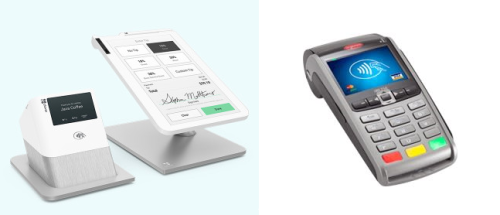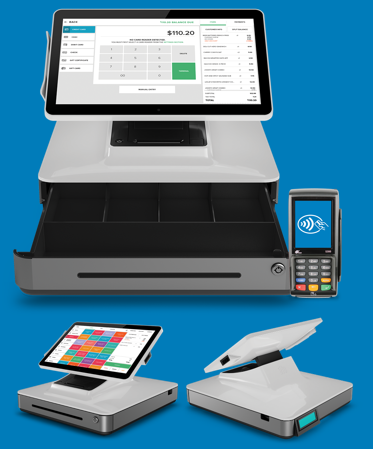What is a POS System?
POS stands for “point of sale” and refers to software and machines that perform functions for a business. Most companies refer to both the hardware and software as the “POS system” but some mean the software only. This is more common for POS software that doesn’t require specialty hardware, such as POS programs that are loaded locally onto a computer. POS systems are more robust than cash registers, offering more features. Specific features vary, but can include functions such as payment acceptance, inventory management, employee timeclock and scheduling, integration with accounting software, restaurant functions like table management or delivery tracking, and more. It’s not necessary to use a POS system, but it can help streamline processes and make business functions easier on you and your staff. Fortunately, there's no specific time when you need to buy a POS system. You can get one when you start your business or any time after - whenever it makes sense for your eneds.POS Features
POS systems offer a number of features, and the specifics will vary by system. However, some features are more common than others and will be available with most POS systems. Here are some of the common features you can expect. Payment Acceptance Often a core feature, payment acceptances enables payment for the goods or services you provide. Most systems can track multiple forms of payment, including card payments, cash, and checks. Accepting credit cards will require a merchant account, but whether that's with the POS company's processing division or with another processor depends on the system you use. Inventory Management Allows you to track stock levels, reorder items to avoid out of stocks, and add new products to your system to lookup or scan a barcode. Inventory management often has search functions and reports that can be run as-needed or scheduled, making it a more robust choice than manual or spreadsheet-based inventory management. Employee Timeclock An integrated timeclock means your employees clock in and out directly through the POS system, which records their punches. Some systems may also offer advanced employee functions, such as integration with payroll. Timeclocks may also provide an option to display messages (such as company updates) when employees punch in. Reporting POS systems offer sales reports, labor reports, inventory reports, and more. Some systems only offer pre-made reports while others allow you to create custom reports showing specific information and fields that you choose. Custom reporting can be convenient to identify patterns such as busy times and what items are most likely to sell and when. Accounting Software Integration Some POS systems integrate with QuickBooks or other accounting software for easier back office management and reconciliation. If you already use another program for accounting, it can make the transition to a POS system smoother if it integrates with that software.Restaurant-Specific POS Features
Restaurants often seek out additional features, and restaurant-focused POS systems may include options like: Ingredient Tracking Similar to inventory management but specifically for ingredients, the ingredient tracking option helps restaurants manage ingredient levels. This is critical to keeping dishes available, especially for any meals that share ingredients. Customizable Floorplans POS systems with customizable floorplans allow you to configure the dining room in the POS to match your dining room for at-a-glance understanding of open tables and server assignments. Your staff will have an easier time seating guests and using your new system if it looks like your actual dining room layout. Tabs With tab features, you can start and close out tabs for customers, as well as move drinks over to another table. It's particularly important for bars or restaurants with high alcohol sales, as customers expect to be able to use this option to keep the drinks coming. Happy Hour Pricing Restaurants that offer happy hour specials prefer a POS system that automatically updates pricing during the set happy hour timeframe. That eliminates the need for servers or bartenders to do the math themselves or override pricing in the system, ensuring faster and more accurate happy hour order entry. Check Splitting While check-splitting is a common POS feature, each system’s implementation varies. Some systems let you split checks fractionally (in half, 4 ways, etc.) while others let you split it by item or print individual checks for a guest that needs to leave early. Delivery Management For restaurants that deliver, accepting and tracking those orders requires special features. Some delivery management features integrate with your website if you accept online delivery orders. Delivery tracking may include automatic route generation and driver assignment capabilities. Remember, exact features vary by system. For detailed overviews of individual options, be sure to check out our POS system directory.POS Stations vs. Credit Card Machines
Many people wonder about the difference between POS systems and credit card machines. Both have the ability to accept payments, but credit card machines are much more limited in features beyond that.
The Clover Station 2018 and an Ingenico credit card machine.
Machines are intended as payment terminals. A credit card machine can accept payments with credit and debit cards, process refunds or voids, and provide basic transaction reports. A POS system, on the other hand, can do those functions and more. POS systems offer the non-payment business features mentioned above, such as inventory management and employee timeclocks. They typically offer robust reporting not just on daily sales but on labor, inventory levels, and other important metrics. POS systems also allow you to connect compatible “accessories” to create your own custom solution. Accessories include things like cash drawers, barcode scanners, customer-facing displays, kitchen order printers, and produce scales. Many POS systems feature integrated credit card readers built into their hardware, but in some cases, you’ll need to attach a credit card machine to the POS system if you intend to take cards. In those cases, you’d have both a POS system and a credit card machine. Credit card machines are lower cost than POS systems. A basic chip-capable credit card machine starts around $300. Full POS systems (the kind that include cash drawers and receipt printers) often start around $1,000.Best POS System
These days, there are so many choices that’s it’s hard to narrow it down to call one or two options the best POS system. As with most things, the best system for you will depend on your specific feature needs and your budget. You’ll also want to consider whether you should choose a proprietary or universal POS system. Unlike credit card processing reviews, POS system reviews can give accurate information about the system and its features. However, it’s still worth taking “best POS system” lists with a grain of salt. Different reviewers will have different needs and even different costs to use the system, all of which can affect their satisfaction with the machine. When reading reviews, look for details on the features, which won’t change from one business to the next. We'll get into a few specific POS systems in the rest of this article, but remember, a variety of different systems may have the features and price that make it the best for you.Proprietary vs. Universal POS Systems
A “proprietary” POS system is one that only works with a particular processor or limited number of processors. These are offered by processing companies that want to lock you in to their own processing, and by equipment manufacturers that have cut deals with processors. Those deals stipulate that the equipment manufacturer will restrict the system to one or two compatible processors in exchange for a cut of the profits. Square’s Register and Stand are examples of proprietary POS systems – they only work with Square credit card processing. NCR Silver is an example of a universal system – any processor can choose to support it. Somewhere in the middle between proprietary and universal systems are systems that work on one processor’s platform, but many processing companies offer it. An example is TSYS’ Vital Pro system, pictured below. It can only be used on TSYS’ platform, but any TSYS-partnered processing company can offer the Vital system.
It can only be used on TSYS’ platform, but any TSYS-partnered processing company can offer the Vital system.
Clover Stations
The Clover Station is a system that doesn’t neatly fit into proprietary or universal for one reason: it can be used with many processing companies, but it’s not reprogrammable. Most businesses ask about a system’s status to determine if they would be able to use that same system with another processor if necessary. The Clover Station, which runs on the First Data (now Fiserv) platform and can be provided by any company that works with Fiserv, can’t be reprogrammed. That makes it closer to a proprietary system even though there are many companies that can offer it initially.Popular POS Brands
There are many popular POS brands, including proprietary and universal options. If you’ve visited a coffee shop recently, you’ve probably seen Square’s POS system. Anyone who has worked in the restaurant business has probably used Micros at some point in their career. But there are far more than just those. Some popular brands include:- Aloha
- Clover POS
- Harbortouch
- Lightspeed
- Micros
- NCR Silver
- Revel
- Shopkeep
- Square
- Toast
Best Retail POS System
Retailers have a lot of choices when it comes to POS systems, in part because they don’t usually need special functions. The default options in most POS systems more than suit the needs of traditional brick and mortar retailers. If you’re looking to take payments, track inventory, and run reports, you’ll find those features readily available. However, you may still want to narrow down your choices depending on your preference. For example, you may want a tablet POS system or a cloud-based solution. Whenever possible, we suggest considering universal POS systems in case you want to switch credit card processors in the future. Some popular POS systems that cater to retail include:- BrightPearl
- Clover Station
- Lightspeed
- NCR Silver
- RetailEdge
- Revel
- Shopkeep (now Shopkeep by Lightspeed)
- Vital Pro
Best Restaurant POS System
Restaurants need different functions that retailers when it comes to POS systems. Full serve restaurants may want a customizable floorplan dining room management option to allow for efficient seating and tracking. You may also want the ability to split checks, start tabs, and transfer tables. Quick serve and delivery restaurants will want features like combo-builders to bundle items into combo meals, or delivery management and tracking. POS companies know that restaurants need different features, so some POS systems are specifically geared toward restaurants. While you can use a non-restaurant-specific POS system, if you need particular features, you may find them more readily in restaurant-specific systems. As you can imagine, even within POS systems for restaurants, you’ll want to choose a system that has the functions your specific restaurant needs. If you don’t accept orders for delivery, for example, you won’t need to seek out a system that offers delivery tracking. At CardFellow, we advise choosing universal systems when possible. That gives you the ability to switch credit card processors in the future without having to purchase a new machine. Some popular universal restaurant-focused POS systems include:- Aldelo
- Aloha
- Ambur
- Micros
- Microsale
- MicroWorks
- NCR Silver
- Paradise
- Revel
- HungerRush (formerly Revention)
- TouchBistro




